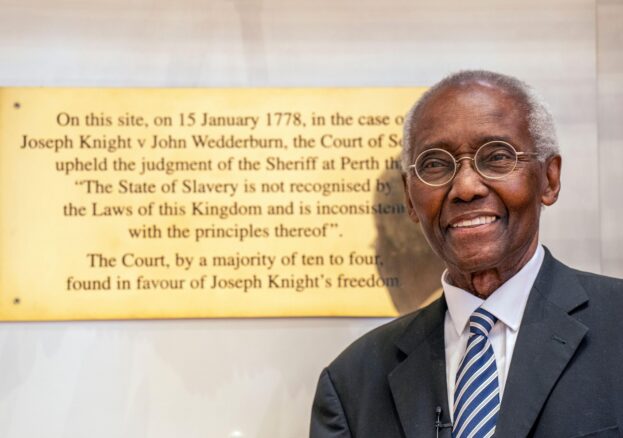Jamaica-British academic and human rights activist, Sir Geoff Palmer, KT, OBE, who was a professor emeritus in the School of Life Sciences at Heriot-Watt University in Edinburgh, in Scotland, was recognised, above all, for his groundbreaking achievements in science and the advocacy for racial equality in reshaping British history and earmarking his legacy during Black History Month.
His death, this past June (at the age of 85), marks the loss of one of Britain’s most distinguished and impactful Black voices—an intellectual pioneer, dedicated human rights campaigner, and tireless advocate for historical truth. Born in St Elizabeth, in Jamaica, Sir Geoff’s journey from humble beginnings to international recognition embodied resilience, excellence, and grace.
His personal narrative was deeply intertwined with the story of the Windrush generation, highlighting a journey marked by struggle, determination, and profound contributions to British society.
Sir Geoff’s early life in Jamaica set the stage for his enduring drive for excellence, with his mother, who travelled ahead of him to England in the early 1950s, symbolising the sacrifice and determination of the Windrush Generation. He came to England at the age of fourteen - following is mother - and joining thousands of Caribbean migrants making the challenging journey to post-war Britain.
Despite facing societal barriers, his education became a powerful vehicle of change. Sir Geoff’s tenacity and intellectual curiosity propelled him forward, leading him to study botany at the University of Leicester and later pursue postgraduate studies in grain science at the University of Edinburgh and Heriot-Watt University.
Sir Geoff Palmer became an esteemed figure within academia, particularly noted for his groundbreaking contributions to the brewing and malting industries. His scientific innovations were transformative, notably his development of the barley abrasion process—a discovery that revolutionised the brewing industry globally.
This innovation significantly enhanced the efficiency and quality of beer production, and today, his methods are integral to brewing processes used by major international breweries. In 1989, Sir Geoff Palmer made history by becoming Scotland’s first Black professor, accepting a position at Heriot-Watt University.
His ascent to this prominent role symbolised an extraordinary breakthrough in a society that, at the time, rarely acknowledged the contributions of Black Britons at senior academic levels. It was a moment of personal triumph but also an enduring victory for the broader community, inspiring generations to follow his path of excellence.
Throughout his career, Sir Geoff also founded the International Centre for Brewing and Distilling at Heriot-Watt University, establishing the institution as a world-renowned centre for scientific innovation and learning. His passion for education transcended his technical field; he was deeply committed to mentoring young scholars, especially from underrepresented backgrounds, reinforcing his belief that diversity in academia enriches all.
Beyond his scientific contributions, Sir Geoff Palmer’s life was profoundly shaped by a passionate commitment to social justice and historical truth. He recognised early the importance of confronting uncomfortable historical truths, particularly Britain’s involvement in slavery and colonialism, which profoundly impacted Caribbean nations and the global Black diaspora.
Palmer became one of Britain’s most compelling voices advocating for the honest acknowledgment of the nation’s complex past. As Chair of the Edinburgh Slavery and Colonialism Legacy Review, he bravely led public conversations about Scotland’s direct involvement in the transatlantic slave trade. His insistence on historical transparency was instrumental in influencing educational curricula, institutional accountability, and broader public understanding.
In 2014, his extensive contributions to human rights, education, and science were honoured with a knighthood. A decade later, in recognition of his enduring influence and distinguished public service, he was further honoured with Scotland’s highest order of chivalry, becoming a Knight of the Thistle in 2024—cementing his legacy as one of the nation’s most revered public figures.
In 2020, Sir Geoff Palmer shared his personal story and reflections in a deeply moving article entitled: ‘My Mother, Jamaica, Windrush, and Me.’ In this heartfelt narrative, he eloquently captured the experience and impact of the Windrush generation, illuminating the courage of those who made the arduous journey to Britain, as well as the vital contributions they and their descendants made to British society.
His article emphasised not only personal sacrifice and resilience but also the crucial importance of recognising and respecting this generation’s legacy. It served as a profound reminder of the dignity and strength that defined the Windrush pioneers, reflecting Palmer’s lifelong dedication to truth and historical recognition.
One of the hallmarks of Sir Geoff’s remarkable career was his unwavering commitment to mentorship and support of young Black Britons. Recognising the barriers that many encountered, he tirelessly advocated for inclusivity and diversity within educational institutions.
Numerous students and young professionals attribute their successes and aspirations directly to his guidance and inspiration. His roles extended beyond academia, as he was regularly invited to speak publicly about race, inclusion, and equality.
His calm yet authoritative presence inspired countless people of all ages, races, and backgrounds to reflect, challenge biases, and actively strive toward a fairer society. Throughout his rich and demanding professional life, Sir Geoff remained devoted to his family, deeply cherishing their support and affection.
His life in Penicuik, Midlothian, was shared lovingly with his wife Margaret, their three children, and grandchildren. They provided him with a personal grounding amidst his national and global responsibilities.
His home was a place of warmth, hospitality, and intellectual discussion, reflecting the values he so openly championed in public. In later years, Sir Geoff Palmer faced significant health challenges, being diagnosed with prostate cancer in 2022.
He confronted this illness with characteristic courage, dignity, and optimism, becoming an advocate for early diagnosis and treatment, particularly among Black men who statistically faced greater risks. Following his passing, heartfelt tributes flowed from around the globe. Foysol Choudhury MSP described Sir Geoff as “a trailblazer and courageous voice for justice and equality”.
Heriot-Watt University’s Principal, Richard Williams, praised Palmer’s remarkable influence, calling him “an inspiration to colleagues past and present and countless students around the world”. His life and work have been widely recognised through numerous accolades and honorary degrees.
Yet, beyond awards and honours, his most enduring legacy resides in the countless lives he touched—students who became leaders, scholars who continued his work, and communities inspired to confront historical injustice with courage and honesty. Sir Geoff Palmer leaves behind a profound and indelible mark on British society.
His pioneering scientific contributions revolutionised the brewing industry, but it was his passionate advocacy for racial justice and historical truth that truly set him apart. He exemplified courage, dignity, and compassion in every facet of his life, becoming a beacon for generations seeking inspiration, wisdom, and justice.
His loss, his legacy endures through the institutions he shaped, the conversations he initiated, and the countless individuals he inspired. Sir Geoff Palmer’s remarkable journey—from the Jamaican countryside to international acclaim—stands as an eloquent testament to the enduring power of resilience, knowledge, and integrity.
His memory will be cherished, honoured, and celebrated, a powerful reminder that true greatness lies not merely in individual achievements but in one’s impact on the lives of others. His story, forever intertwined with the Windrush narrative and Britain’s journey toward justice, will continue to educate, inspire, and guide generations yet unborn.
In remembering Sir Geoff Palmer, we reaffirm our commitment to his life’s work—seeking truth, pursuing justice, and fostering equality. His voice may now be silent, but his words and actions echo in every future endeavour to build a fairer, more inclusive Britain.











